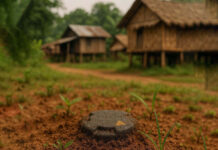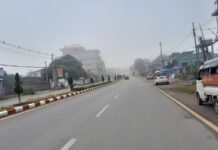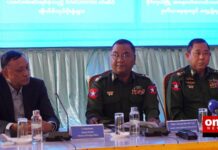[dropcap color=”#FE5722″]T[/dropcap]he New Mon State Party (NMSP) together with the Lahu Democratic Union (LDU) finally signed the Nationwide Ceasefire Agreement (NCA) on February 13, 2018, in Nay Pyi Taw, making them the first two Ethnic Armed Organizations (EAOs) under the National League for Democracy (NLD) regime to join the other eight signatories that inked the agreement in October 2015, during the tenure of Thein Sein government.
Following the signing, the NMSP went about trying to organize the national-level political dialogue, better described as public consultation meeting, among the Mon ethnic. However, it was disrupted by the Military or Tatmadaw, which has frustrated and made the NMSP lost considerable trust in the peace process.
According to Nai Han Thar, who told the Mon News Agency recently: “When we were preparing to hold the public meetings in our military-controlled areas, the Tatmadaw told us not to have more than 20-30 people in each meeting. Having only 20-30 people is similar to a gathering of petty cockfight.”
He further stressed: “There are a lot of people. How could this be appropriate? This [restriction] wasn’t made known to us during the Union Peace Dialogue Joint Committee (UPDJC) meeting. This limitation was only placed when we actually started to prepare for [the public meetings]. We were dissatisfied with this restriction.”
But later on, this restriction of the Tatmadaw was resolved with the formation of the Mon State National-Level Political Dialogue Supervisory Committee.
According to announcement 1/2018 released on March 23 under the Aung San Suu Kyi-led UPDJC, the nine-member Supervisory Committee was formed comprising of a minister from the Mon State government, one Tatmadaw representative, one Pyithu Hluttaw representative, two NMSP representatives, one Karen National Union (KNU) representative, and a representative each from the National League for Democracy (NLD), the Mon National Party (MNP), and the All Mon Region Democracy Party (AMRDP).
The NMSP was given a solid backing to hold public consultation meeting when Minister Kyaw Tint Swe of State Counselor Office, Vice-Chairman of National Reconciliation and Peace Center (NRPC) said that the government is responsible for organizing a national-level political dialogue for the Mon people.
He said at the Office of Mon State Government in Mon State on April 2: “I would like NMSP, a NCA signatory during the time of new government, to successfully hold the national-level political dialogue. The government is responsible for organizing the political dialogue depending on mutual trust and understanding. If necessary, the NRPC is to fulfill the needs.”

Mon national-level dialogue
According to the Convening Committee for Mon National-Level Political Dialogue Announcement of May 7, held in Ye, Mon State, the national-level dialogue was convened from 5 to 7 May attended by some 900 participants, with NMSP, AMRDP and MNP leading the dialogue.
Respected Mon clergy; NRPC officials; UPDJC members; Mon State Chief Minister and government members; Mon State National-Level Political Dialogue Supervisory Committee; EAOs’ members; Political Parties; Mon Civil Soceity Organizations; Mon Youth and Women organizations; and respected individuals were invited.
The federalism-based politics, economy, social, land and environmental issues were discussed and different opinions of the participants gathered.
The statement said that the Mon people resolved to achieve a federal union based on democracy, equality and rights of self-determination, through peaceful political means and would participate as a force in realizing it.
No common inputs
According to the Hinthar Media, around 500 participants took part in the national-level political dialogue for ethnic Mon including 137 people in the political sector, 120 people in the economic sector, 106 people in the social sector, and 108 people in the land and natural resources sector.
However, Min Kyaw Zeyar Oo, Secretary (2) of the Convening Committee, told Hinthar Media: “Both similarities and differences will be compiled. Then, they will be submitted to the UPDJC via the Supervisory Committee. No decisions will be made.”
The compilation will then be submitted to the next session of the 21st Century Panglong Conference through the UPDJC.
Outlook
In this Mon national-level political discussion the most outstanding and controversial issue is within the political sector on whether self-determination, sovereignty, and state constitution should proceed based on the existing constitution or writing a new one should be reconsidered.
The continuation of the armed conflict in Kachin and Shan States clearly worries the NMSP Chairman Nai Htaw Mon as he explicitly mentioned in his opening speech and stressed that the solution to it has to be found for the peace negotiation process to be conducive.
Until lately, among the ten EAOs that have signed the NCA since October 2015, only three ethnic groups – Karen, Chin, and Pa-O – have held ethnic-based political dialogues and now the Mon. But whether the good example of Mon solution could also apply to the Shan and Arakan or Rakhine ethnic groups, which are still unable to convene the public consultation meetings, to secure the cooperation of the Tatmadaw is still not clear for the moment.
In sum, the Mon meeting again pointed out the same old crucial issues of the need to tackle the constitutional amendment crisis and the ending of ethnic armed conflict so that peace could be restored in the country and national harmony become a reality.











Leave a Comments